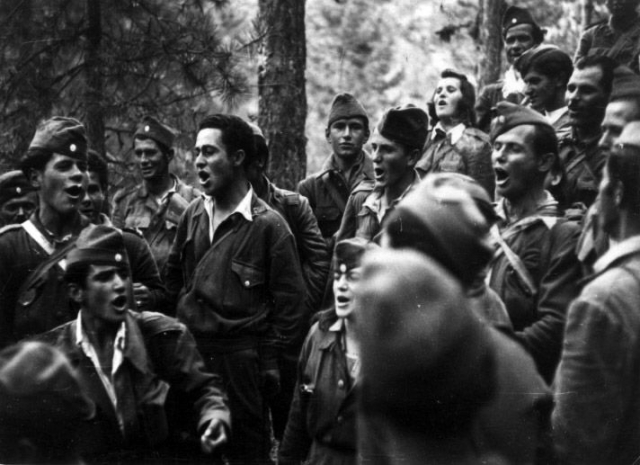Photo: General Secretariat for Press and Information
The specificity of this issue is associated mostly with the dimension of the Macedonian question that preoccupied both the Communist Party of Greece and the Greek state from the period between the two world wars until 1949. During its 5th plenum, the Communist Party of Greece decided that if it won the war it would trigger all procedures to declare the independence of the Greek region of Macedonia or of part thereof. This decision led to significant consequences for the party's place in Greek society and its relation to it.
What was the policy of the Greek government to these communities after the collapse of the Ottoman Empire?
The policy ranged from reserved to tolerant, but in some cases, it was hostile and filled with suspicion. Especially the last period remembered by the members of the community, namely the dictatorship of Ioannis Metaxas, was a time when the Greek state treated the Slavic-speaking communities in a very negative way. It forbade them to speak their language and there are many testimonies about penalties that were imposed on people from those regions because they spoke the "idiom," as their language was called. They were not allowed to present in public their traditions and everything that characterized their culture. In modern terms, we could say that an aggressive assimilation policy was in force at that time.
Many analysts believe that this was one of the main reasons for Slavic Macedonians to support the Communist Party. They believed it was the party that most actively supported their rights as members of a national minority.
Later many researchers supported the position that the inclusion of a large number of Slavic-speaking residents of the region of Macedonia was associated much more with demands for national independence than with ideological goals for a socialist transformation and so on. In short, Slavic Macedonians perceived the Communist Party as a political body that could meet their minority or national demands.

Partisans of the Democratic Army of Greece singing in a mountainous area in the region of Western Macedonia, 1948
Could we say that these people had a clear national consciousness?
My personal opinion is that this statement is not true for a very large number of them. For a few others it is the opposite. An extensive debate about the national consciousness took place in Greece at that time, with many aspects and disagreements. But I think that part of this population had a clear consciousness. Many of them had a Greek consciousness while others did not. Furthermore, there is no doubt that a possibly significant part of these communities had no clear national consciousness.
This is undoubtedly related with the fact that the year 1912 when the Ottoman Empire disintegrated after the Balkan Wars, came too soon for these people. Only 30-35 years had passed since then and in fact, only one generation had grown up within Greek Macedonia.
In addition, many of these communities were isolated because they were located in inaccessible areas. This made the procedure to form a national consciousness even more complicated and difficult.
However, many of these communities reacted very negatively to the aggressive assimilation policy of the state and were very dissatisfied with how the local and public authorities in general treated them. In addition, some of these people, especially in the region of Eastern Macedonia and some in Western Macedonia collaborated with the Bulgarian authorities and adopted the accession of Eastern Macedonia and Thrace to the Bulgarian state during the war as a positive development.
That is why I could say that this question had many aspects. One of them was that in those regions there was not one but different national consciousnesses - Greek and Bulgarian, as well as others that were more obscure. In other cases, there were more reactions of discontent against the state rather than an expression of a certain consciousness and chance played a role in others. I.e., some communities were in the centre of events simply because they lived in the border areas of Greece with Yugoslavia and Bulgaria.
For example, forced recruitment took place among the Pomaks and some of them were forced to withdraw to Bulgaria after the surrender. These people were mobilized by the Democratic Army because they were living in the region of Eastern Macedonia and Thrace. There is evidence that the Pomaks were very bad fighters. Obviously, they did not want to be involved and many detachment commanders described their participation in a very negative way. That is why they were commissioned to perform mostly ancillary works, such as cooking or road building. This means that geography played a very critical role with regard to civil wars.
What factors determined the loss of the war by the communists? What were the internal and external factors?
There were two main factors. The external one undoubtedly was the US aid to the Greek government provided through the Marshall Plan and Truman Doctrine. It was a significant aid in different areas and the aid from the socialist countries to the Greek communists was not equal to it and could not counteract it.